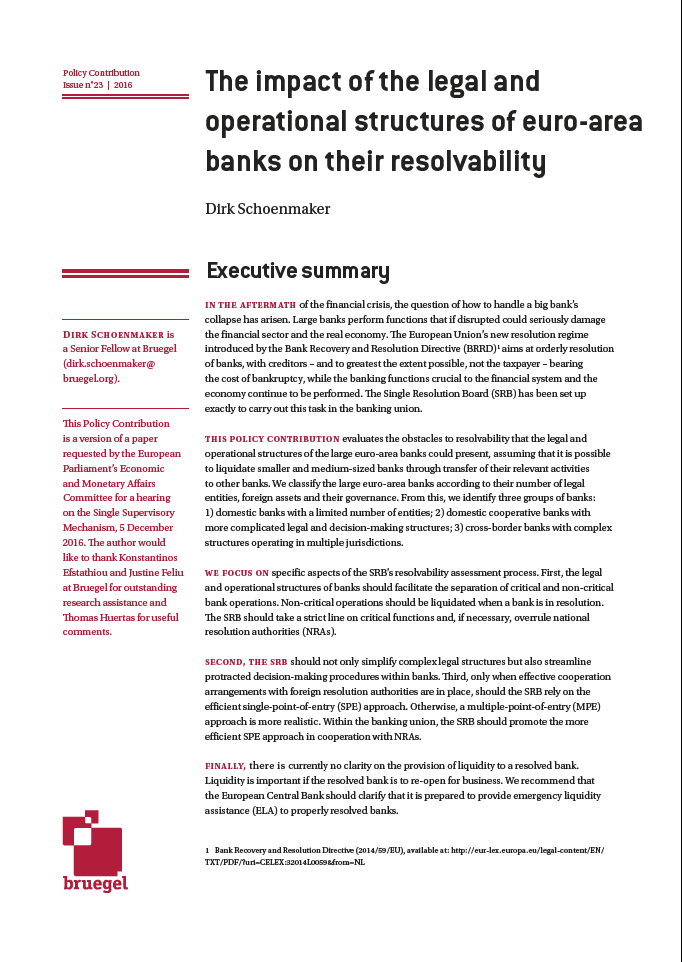Policy Contribution
The impact of the legal and operational structures of euro-area banks on their resolvability
Following the financial crisis, the question of how to handle a big bank’s collapse has come to the fore. This Policy Contribution evaluates the obstacles to resolvability that the legal and operational structures of the large euro-area banks could pose to the European Union’s new resolution regime.
This material was originally published in a paper provided at the request of the Committee on Economic and Monetary Affairs of the European Parliament and commissioned by the Directorate-General for Internal Policies of the Union and supervised by its Economic Governance Support Unit (EGOV).
The opinions expressed in this document are the sole responsibility of the authors and do not necessarily represent the official position of the European Parliament.
The original paper is available on the European Parliament’s webpage.
© European Union, 2016.
In the aftermath of the financial crisis, the question of how to handle a big bank’s collapse has arisen. Large banks perform functions that if disrupted could seriously damage the financial sector and the real economy.
The European Union’s new resolution regime introduced by the Bank Recovery and Resolution Directive (BRRD) aims at orderly resolution of banks, with creditors – and to greatest the extent possible, not the taxpayer – bearing the cost of bankruptcy, while the banking functions crucial to the financial system and the economy continue to be performed. The Single Resolution Board (SRB) has been set up exactly to carry out this task in the banking union.
This Policy Contribution evaluates the obstacles to resolvability that the legal and operational structures of the large euro-area banks could present, assuming that it is possible to liquidate smaller and medium-sized banks through transfer of their relevant activities to other banks.
Dirk Schoenmaker classifies the large euro-area banks according to their number of legal entities, foreign assets and their governance. From this, he identifies three groups of banks:
- domestic banks with a limited number of entities;
- domestic cooperative banks with more complicated legal and decision-making structures;
- cross-border banks with complex structures operating in multiple jurisdictions.
The paper focuses on specific aspects of the SRB’s resolvability assessment process.
- The legal and operational structures of banks should facilitate the separation of critical and non-critical bank operations. Non-critical operations should be liquidated when a bank is in resolution. The SRB should take a strict line on critical functions and, if necessary, overrule national resolution authorities (NRAs).
- The SRB should not only simplify complex legal structures but also streamline protracted decision-making procedures within banks.
- Only when effective cooperation arrangements with foreign resolution authorities are in place, should the SRB rely on the efficient single-point-of-entry (SPE) approach. Otherwise, a multiple-point-of-entry (MPE) approach is more realistic. Within the banking union, the SRB should promote the more efficient SPE approach in cooperation with NRAs.
There is currently no clarity on the provision of liquidity to a resolved bank. Liquidity is important if the resolved bank is to re-open for business. Dirk Schoenmaker recommends that the European Central Bank should clarify that it is prepared to provide emergency liquidity assistance (ELA) to properly resolved banks.












